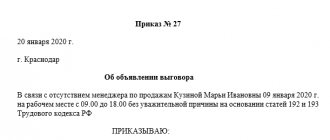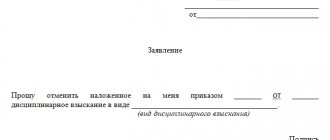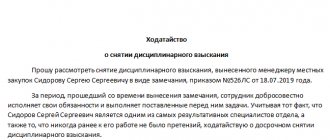Home / Labor Law / Responsibility / Disciplinary
Back
Published: 04/29/2016
Reading time: 6 min
0
2109
Workers can officially not only be rewarded for exceeding the work plan, but also punished for violating discipline. In this case, the sanctions applied are called penalties and are regulated by part three of the Russian labor code, namely chapter number 30 “Labor discipline”.
Three articles from 192 to 194 are devoted to penalties from employees of enterprises, institutions and organizations.
Penalties are imposed for violation of labor discipline, that is, for any guilty illegal action (or inaction) within the framework of work activities, as well as non-compliance with the rights and obligations established by the employment contract and defined in Articles 21 and 22 of the Labor Code of the Russian Federation.
In accordance with the above legislative norms, each officially employed employee undertakes to comply with the internal regulations of the organization and the discipline established in it.
The law obliges the manager or employer to look after his subordinates, while observing regulatory legal acts, including local ones, as well as all clauses of the collective agreement and various labor agreements. The employer has the right to bring disciplinary action against violators within the framework of the procedure established by the Labor Code and other laws.
- In what cases can disciplinary action be imposed?
- The procedure for imposing disciplinary sanctions
- Variations of disciplinary sanctions
- Expulsion cannot be pardoned
- Removal of disciplinary action Automatic
- On appeal
- By decision of the parties
Disciplinary action under the Labor Code of the Russian Federation
Disciplinary action in labor relations is a punishment applied to an employee of an organization, regardless of his rank and status. A penalty may be imposed in the following cases:
- in case of failure to perform or poor performance of one’s official duties;
- in case of violation of the company's norms and rules prescribed in internal regulations: violation of labor discipline,
- presence at work under the influence of alcohol or drugs,
- disclosure of trade secrets, etc.
These and other reasons for which punishment may follow are spelled out in the Labor Code (LC) of the Russian Federation, in Art. 81.
It is worth noting that a citizen’s ignorance of his official duties does not relieve him of responsibility for failure to fulfill them. All actions that an employee must carry out are specified in the employment contract concluded between him and the employer. Familiarization with this document is a priority when applying for employment.
Application of a disciplinary sanction is allowed no later than 1 month from the date of recording the offense, and does not take into account the time spent on sick leave, on vacation, as well as the period of time spent taking into account the opinion of the representative body of employees.
Disciplinary measures can be applied only if the employee’s guilt is proven and the fact of the violation is documented. For example, if an employee did not go to work for an unexcused reason, and his absenteeism record was not marked on his work time card, then it will not be possible to take any disciplinary measures against him.
A disciplinary violation can be recorded with the following documents:
- act. It is drawn up mainly in case of violations of a disciplinary nature. For example, if you are late for work, absenteeism, etc.;
- memorandum. It is drawn up by the manager of the employee who has committed a crime regarding non-fulfillment or poor performance of official duties, in case of violation of reporting, etc.;
- protocol of the commission's decision. This document is drawn up, for example, in the event of material damage to the company.
The employee has the right to appeal a disciplinary sanction with the help of the state labor inspectorate.
The validity period of a disciplinary sanction is one year and if during this time the employee does not receive a new disciplinary sanction, then he will be considered without a disciplinary sanction.
What is discipline and punishment
Any organization has a number of rules and regulations that govern the work process. Strict adherence to them by the employee during working hours is labor discipline. Rules and regulations of labor discipline and requirements for their compliance are reflected in the job description, internal labor regulations, and other internal regulations of the organization.
When starting work, it is important for an employee to know what is required of him during the work process. If he doesn’t know this, then he’s not violating anything and there’s nothing to punish him for either. It is important to familiarize the employee with all regulations before signing an employment contract. These are the requirements of Article 68 of the Labor Code of the Russian Federation.
During the work process, the worker is obliged to obey internal regulations and perform job duties for his position (profession). By not following the rules and not fulfilling official duties, an employee commits a disciplinary offense. In this case, the enterprise administration has the right to influence the violator and apply a disciplinary sanction - a measure of the employer’s influence on the employee in case of failure to perform or improper performance of official duties, violation of labor protection standards and rules, safety regulations and internal labor regulations. This is a punishment that is allowed within the framework of the law for an employee committing an offense at the workplace and during working hours.
Penalized for:
- violation of production standards;
- product defects;
- disclosure of trade secrets, etc.
But all requirements must be enshrined in local regulations and communicated to the employee against signature.
Consequences for the employee
If a penalty is imposed on an employee, the employer can...
- Deprive (fully/partially).
- Deprive of other payments.
True, only on condition that there is such a provision in the company’s documents. As for dismissal, such punishment usually follows only particularly serious violations. For example, if the company suffered losses as a result of the offender’s misconduct, the employee was found to be intoxicated at work, or the employee, after being disciplined within 1 year, was again found to have violated his duties.
Grounds for disciplinary action
Internal labor regulations, local regulations, employment contracts and job descriptions can regulate the procedure for interaction between an employee and clients (Article 189 of the Labor Code of the Russian Federation; letter of the Ministry of Labor of Russia dated September 16, 2016 No. 14-2/B-888). These documents may establish a ban on the use of profanity in communication, the inadmissibility of insults or other forms of unethical behavior.
This is also important to know:
How does the disciplinary procedure proceed under Article 193 of the Labor Code of the Russian Federation?
In addition, the rules may be detailed in a separate document, such as a code of conduct, ethics and business communication, and include the following employee responsibilities:
- maintain a polite tone when communicating with clients and colleagues, show respect and tolerance;
- do not allow obscene, offensive and rude words, categorical statements, incorrect tone in communication;
- be attentive and friendly;
- avoid conflict situations, do not commit provocative actions;
- resolve controversial issues in a timely manner, while using a constructive method of dialogue and business correspondence;
- contribute to the formation and maintenance of a favorable moral and psychological climate in the team;
- support and develop the initiative of colleagues.
The company is obliged to familiarize the hired employee with its rules before signing the employment contract (Part 2 of Article 22, Article 68 of the Labor Code of the Russian Federation). If it adopts new local regulations or changes already existing versions of internal documents, then all employees must be familiarized with them under signature before they are put into effect, and in the case of a change in the essential terms of the employment contract - two months before such a change.
Please note that the established rules should not worsen the position of employees regarding labor legislation, the collective agreement (if there is one) and must take into account the opinion of the representative body of employees (if there is one in the organization) (Article 8 of the Labor Code of the Russian Federation). Otherwise, they may be declared invalid, and the imposition of disciplinary sanctions for non-compliance with the rules may be unlawful.
It is the company’s responsibility to prove that an employee has committed a disciplinary offense. In addition, she must prove the consequences that resulted from the employee’s actions and the amount of damage caused.
Mistakes that are made in the foreclosure procedure
- No explanation requested. In no case should measures be taken against an employee without finding out the reasons for the misconduct; perhaps his lateness is due to illness or another valid reason. Subsequently, the presentation of evidence by the allegedly guilty party will serve as a cancellation of all measures taken and the collection of compensation from the organization.
- The blame was placed on something that was not initially part of the employee’s duties. It happens that employees are required to perform those works that are outside the scope of their job description, and therefore, they cannot be punished for non-fulfillment, but must be approached to change internal documents, the terms of the employment contract, and only then apply measures.
- Deadlines. Disciplinary measures cannot be applied beyond the deadline. Not only does the employee have deadlines for appealing, but the law also requires the employer to strictly adhere to the time intervals. A month is given for everything; it is during this period that the final decision must be made.
- Repeated punishment for one offense. The rule of one offense = one punishment must be followed in any case. It will be fair. Otherwise, everything will lead to discrimination and violations of workers' rights, which is unacceptable.
This is also important to know:
Sample characteristics for an award: when required, writing structure, types
Often, simultaneously with recovery, the employer recovers from the employee, for example, recovery of damages from the employee in court. In this case, the process becomes even more complicated. To file an application in court, it is better to seek professional legal assistance; only specialists can competently and correctly, referring to the rules of law and judicial practice, draw up a statement of claim and represent your interests at all stages until a positive solution to the problem. Is it possible to challenge a disciplinary sanction? Now you know that yes, let's do this together.
Disciplinary action and evidence
The procedure for imposing a disciplinary sanction is regulated by the provisions of the Labor Code.
The fact of violation by an employee of labor discipline is recorded in writing, for example, in a memo addressed to management, an act, a decision of a commission based on the results of an inspection, since in the event of a trial the employer will need to provide evidence of the misconduct (paragraphs 38, 43, 49, 53 of Resolution No. 2 ).
The documentary basis for the penalty must describe what the employee did and when, what clause of which local regulatory act he violated, and what consequences his actions entailed. You can also give recommendations regarding disciplinary action against the offender.
Please note that the obligation to familiarize the employee with these documents is not established by labor legislation.
Once the company becomes aware of a disciplinary violation, it should request a written explanation from the employee for his actions. It is advisable to document this request, that is, draw up a notice of explanation and hand it over to the employee against signature, indicating the date of review on the copy of the document and signature on receipt.
Sample notification for providing explanations
The employee must provide written explanations within two working days, which are counted from the date following the day the demand was submitted (Article 191 of the Civil Code of the Russian Federation). Deprivation of such a right may be grounds for declaring a disciplinary sanction illegal (decision of the Moscow Regional Court dated August 19, 2010 in case No. 33-14897).
Please note that when calculating the period for providing explanations, the individual work schedule of the employee is not taken into account (determination of the RF Armed Forces dated July 30, 2008 No. 36-B08-23).
If after two working days there are no explanations, the company draws up an act of refusal to provide them. For example, if explanations are requested on Monday, the company waits for them for the next two days and, if they are not provided, draws up a corresponding report on Thursday.
Lack of explanation does not prevent the imposition of disciplinary action.
If the employer considers the explanations provided to be valid, disciplinary action may not be applied.
It is important to comply with the deadlines for imposing disciplinary action. It is applicable for a month from the moment the misconduct was discovered (from the moment the employer learned or should have known about this fact), not counting the time of illness of the employee, his stay on vacation, as well as the time required to take into account the opinion of the representative body of employees (Art. 193 Labor Code of the Russian Federation).
It is considered that the company learned about the commission of a disciplinary offense from the moment the employee’s immediate supervisor became aware of it.
The Labor Code specifies the limitation period for imposing a disciplinary sanction (Article 193 of the Labor Code of the Russian Federation):
- within six months from the date of commission of the offense;
- if the misconduct became known during an audit or inspection - within two years from the date of the commission of the misconduct.
So, if due to illness the deadline for imposing a disciplinary sanction is missed, then it can no longer be applied.
The legislation does not provide for a unified form of order to impose a disciplinary sanction. The document must contain the following information: Full name of the employee; his position and structural unit; description of the offense committed; clauses of which local regulations of the employer were violated; links to reports and explanatory notes, acts, decisions/minutes of the meeting of the investigation commission and their details; what type of disciplinary action is taken.
Sample order to impose a disciplinary sanction
If the employee refuses to familiarize himself with the order in writing, it is necessary to draw up a corresponding act.
It is not necessary to make a record of a disciplinary sanction in the employee’s personal card (form No. T-2, approved by the State Statistics Committee of Russia dated January 5, 2004 No. 1). But if necessary (to ensure internal accounting), this information can be reflected in section X “Additional information”.
An entry about a disciplinary sanction is also not made in the work book, except in cases where the disciplinary sanction is dismissal (Part 4 of Article 66 of the Labor Code of the Russian Federation).
This is also important to know:
What is the penalty for systematic delays?
An employee has the right to appeal a disciplinary sanction to the state labor inspectorate, the labor dispute commission and the court (Part 7 of Article 193, Article 382 of the Labor Code of the Russian Federation).
The Labor Dispute Commission is obliged to consider the dispute within 10 calendar days from the date the employee submits the application (Part 2 of Article 387 of the Labor Code of the Russian Federation). If this does not happen, the employee has the right to transfer the consideration of the application to the court (Part 1 of Article 390 of the Labor Code of the Russian Federation).
The period for appealing in court is three months from the date of issuance of the order to apply a disciplinary sanction and a month if the employee was dismissed for a disciplinary offense (Article 392 of the Labor Code of the Russian Federation). In this case, the case for reinstatement at work must be considered before the expiration of a month from the date of receipt of the application to the court. The specified time frame also includes the time required to prepare the case for trial (clause 7 of Resolution No. 2; Chapter 14 of the Code of Civil Procedure of the Russian Federation).
Please note that when filing a claim in court for claims arising from employment relations, including regarding non-fulfillment or improper fulfillment of the terms of the employment contract, employees are exempt from paying fees and legal costs (Article 393 of the Labor Code of the Russian Federation).
If an employee tries to appeal against dismissal for repeated failure to fulfill job duties, and the period for appealing previous disciplinary offenses has expired, the court will not grant his request for reinstatement (Review of legislation and judicial practice of the RF Armed Forces for the second quarter of 2007, approved by the resolution of the Presidium of the RF Armed Forces dated 08/01/2007).
In conclusion, we note that it is important to comply with all legal requirements regarding the procedure for imposing a disciplinary sanction. Otherwise, the employee will have grounds to recover compensation for moral damage from the company (Article 237 of the Labor Code of the Russian Federation), and if he was fired, he will be reinstated in his position and, accordingly, receive a salary for the entire period of forced absence, taking into account interest (monetary compensation) for it delay (Article 236 of the Labor Code of the Russian Federation).
The Ministry of Labor and Social Protection of the Russian Federation indicated that if in the internal labor regulations, local regulations or in the employment contract there are provisions stipulating the inadmissibility of rude, harsh expressions when communicating with clients, then the employer may apply disciplinary measures to an employee who violates these provisions impact (letter of the Ministry of Labor of Russia dated September 16, 2016 No. 14-2/B-888).
In judicial practice, there are examples when the court does not regard the unethical actions of an employee and the expressed opinion different from the position of management as a violation of labor discipline (ruling of the St. Petersburg City Court dated 04/08/2013 No. 33-5330, appeal ruling of the Omsk Regional Court dated 10.23. 2013 in case No. 33-7037/13).
The right to freedom of thought and speech is guaranteed by Article 29 of the Constitution of the Russian Federation. An employee has the right to freely express his opinion and criticize the actions of other persons, if his actions are not offensive in nature and do not humiliate the honor and dignity of the individual.
On the other hand, for a number of professions, failure to comply with ethical standards and rules of official conduct is a disciplinary offense. For example, this applies to employees of municipal services, police, and teachers (decision of the Moscow City Court dated April 10, 2012 No. 33-8753/2012).
To avoid the situations described in the article, the company needs to introduce a corporate culture that:
- includes standards of behavior in the office;
- calls to observe and adhere to the established rules in any situation;
- obliges managers to be an example for their subordinates;
- cultivates respectful relationships between employees;
- allows you to track feedback on team collaboration and periodically survey customer satisfaction levels.
The concept of disciplinary offense
We think it would be useful to clarify what constitutes a disciplinary offense, since practice shows that employers often interpret it erroneously. So, a disciplinary offense is a culpable unlawful failure or improper performance by an employee of his assigned job duties (violation of legal requirements, obligations under an employment contract, internal labor regulations, job descriptions, regulations, regulations, technical rules, other local regulations, orders, other organizational and administrative documents of the employer, etc.).
Only such failure to perform or improper performance of labor duties is considered guilty when the employee’s act is intentional or careless. Failure to perform or improper performance of duties for reasons beyond the employee’s control (for example, due to lack of necessary materials, disability, insufficient qualifications) cannot be considered a disciplinary offense.
https://www.youtube.com/watch?v=ytcopyrightru
For example, the legislation of the Russian Federation does not provide for the right of the employer to recall him from vacation early without the employee’s consent, therefore the employee’s refusal (regardless of the reason) to comply with the employer’s order to go to work before the end of the vacation cannot be considered as a violation of labor discipline (clause 37 of Resolution No. 2) .
Only such illegal actions (inaction) of an employee that are directly related to the performance of his job duties can be recognized as a disciplinary offense. Thus, an employee’s refusal to carry out a public assignment or violation of the rules of behavior in public places cannot be considered a disciplinary offense.
a) the absence of an employee from work or the workplace without good reason.
It must be borne in mind that if the employment contract concluded with the employee or the employer’s local regulatory act does not stipulate the specific workplace of this employee, then in the event of a dispute arising over the issue of where the employee should be when performing his job duties, It should be assumed that, by virtue of Part 6 of Art.
Arbitrage practice. The director of the institution explained that the employee was not at the workplace, which is his office, at the time specified in the dismissal order.
Taking into account the provisions of the employee’s job description submitted to the court by the defendant, the court accepted the plaintiff’s explanations that the office was not his only workplace. The absence of an employee from the workplace for some time, which is not his only one, is not absenteeism.
Thus, the court came to the conclusion that it was necessary to recognize the dismissal order as illegal and satisfy the employee’s request for reinstatement at work (decision of the Leninsky District Court of Kostroma dated May 26, 2010 in case No. 2-568/2010).
b) refusal of an employee, without good reason, to perform labor duties in connection with a change in labor standards in accordance with the established procedure (Article 162 of the Labor Code of the Russian Federation), because By virtue of the employment contract, the employee is obliged to perform the labor function defined by this contract and to comply with the internal labor regulations in force in the organization (Article 56 of the Labor Code of the Russian Federation).
It should be borne in mind that refusal to continue work in connection with a change in the terms of the employment contract determined by the parties is not a violation of labor discipline, but serves as a basis for termination of the employment contract under clause 7, part 1, art. 77 of the Labor Code of the Russian Federation in compliance with the procedure provided for in Art. 74 Labor Code of the Russian Federation;
Arbitrage practice. An MDOU teacher for refusing to work on a shift schedule with other groups of children and in another building after applying disciplinary sanctions in the form of a reprimand and reprimand was dismissed from work on the grounds provided for in clause 5 of part 1 of Art. 81 Labor Code of the Russian Federation.
The court concluded that disciplinary sanctions, including dismissal from work, were illegal and subject to cancellation. By the court's decision, the teacher's claim against the preschool educational institution for the cancellation of the disciplinary sanction, reinstatement at work, payment for forced absence and compensation for moral damage was satisfied in full (decision of the Ust-Kulomsky District Court of the Komi Republic dated December 2, 2011 in case No. 2-467/2011).
c) refusal or evasion without good reason from a medical examination of workers in certain professions, as well as refusal to undergo special training during working hours and pass exams on labor protection, safety precautions and operating rules, if this is a mandatory condition for admission to work.
Also, a violation of labor discipline should be considered a refusal by an employee, without good reason, to conclude an agreement on full financial responsibility for the safety of material assets, if the fulfillment of duties for servicing material assets constitutes the employee’s main job function, which was agreed upon when hiring, and in accordance with According to the current legislation, an agreement on full financial liability can be concluded with him (clause 36 of Resolution No. 2).
Please note that the application of a disciplinary sanction can be recognized as legal in cases of non-fulfillment or improper performance by an employee of labor duties only when he has been familiarized with each of the local acts establishing the relevant duties under his personal signature, because This requirement is provided for in Art. 22 Labor Code of the Russian Federation.
Therefore, courts often overturn disciplinary sanctions against employers due to the lack of familiarization of the employee with the document that he violated.
Arbitrage practice. During the hearing, the court found that when applying for a job, the employee signed only an employment contract and an agreement on full financial responsibility. The job description was approved only in 2012, and disciplinary sanctions were imposed for disciplinary offenses committed by the employee in 2011.
The court concluded that when applying a disciplinary sanction in the form of a reprimand, the employer could not be guided by the job description, since when concluding the employment contract, the employee was not familiar with it, and his job responsibilities were not established. Referring to the letter of Rostrud dated 09.08.
By a court decision, bringing the employee to disciplinary liability was declared illegal (ruling of the Samara Regional Court dated July 30, 2012 in case No. 33-6996).
Specifics of disciplinary sanctions for certain categories of citizens
Another type of disciplinary sanction is provided for civil servants: a warning about incomplete compliance with official duties.
For military personnel, the list of disciplinary punishments has been significantly expanded:
- severe reprimand;
- deprivation of an award badge;
- warning about incomplete job compliance;
- early dismissal. The reason in this case is failure to comply with the terms of the contract;
- demotion;
- demotion in rank;
- deduction from fees;
- expulsion from an educational institution;
- disciplinary arrest.
These types of punishments are enshrined in special legislative acts on public and military service.
The procedure for imposing a disciplinary sanction on an employee
There is a certain procedure for taking measures for a disciplinary violation (Article 193 of the Labor Code of the Russian Federation). A change or omission of any of the stages may make the imposition of a penalty unlawful and lead to its cancellation.
Receipt by the employer of a signal that an offense has been committed.
This signal must be given in written form. This could be an act, a report, a memorandum or a protocol of the commission’s decision after any inspection. Any of the listed documents must contain a description of the violation committed. The date the employer receives the signal is the date the case for imposing a disciplinary sanction is opened.
If there is a dispute, the employer's demand for explanations and the corresponding act on the absence of these explanations in writing are grounds for disciplinary action. However, if the employee provides an explanatory note within the deadlines, the penalty may be canceled.
Presentation of a written request to the employee for an explanation of the committed act.
After reading this requirement, the employee must sign.
The employee's explanation of the event that occurred.
The form of presentation is an explanatory note. It must contain a description of the reasons that led to the violation. The reasons can be either respectful or disrespectful.
This is also important to know:
What the labor inspectorate checks
Free legal consultation We will answer your question in 5 minutes!
Call: 8 800 511-39-66
The assessment of the reasons for this criterion is the responsibility of the employer; he has the right to classify them at his own discretion. The Labor Code of the Russian Federation does not regulate the concept of “good reason”, therefore generally accepted grounds apply: illness, lack of material resources for work, carrying out instructions from superiors, etc.
Free legal consultation
We will answer your question in 5 minutes!
Ask a Question
The employee has the right not to write an explanatory note; in this case, after 2 days of waiting, the employer (or other responsible person) must draw up a special act about the lack of explanations on the part of the employee. This act must be signed by the employer (or the employer’s representative) and 2 witnesses.
Imposition of disciplinary action.
If the employer recognizes the reason for the misconduct on the part of the employee as disrespectful, then he has the right to apply one of the disciplinary measures. Such a decision is formalized by issuing an order. This document should contain the following points:
- order number and date of issue;
- the basis for drawing up the document is the wording that a certain disciplinary measure has been applied to a specific employee (indicating his full name and position);
- an indication of the reason why the penalty was imposed;
- employer's signature.
The order is an important document for confirming the facts of imposition of penalties. Several such documents are a valid basis for the employer to take an extreme disciplinary measure - dismissal (Article 81 of the Labor Code of the Russian Federation).
If there are no other penalties within one year, and after that year, the penalty must be removed from the employee. If the employer wishes, it can be removed during this one year, as well as at the request of the employee, or at the request of a representative body or the employee’s manager.
Familiarization of the employee with the issued order.
This must be done by HR department employees or the employer himself no later than 3 working days from the date of its publication. Familiarization with the order is confirmed by the employee’s handwritten signature. If a citizen refuses this procedure, then a special act is drawn up that records the refusal.
Procedure algorithm
If a violation of labor discipline or inappropriate performance of job duties by an employee is detected, the employer must require him to draw up an explanatory note justifying the reason for the behavior.
If the employee refuses to give an explanation, then a commission is created and a report is drawn up, which records the details of the incident and the offender’s refusal to write an explanation. The document is drawn up two days after the employee refuses to write an explanatory note on the circumstances. It should contain the following information:
- date and place of drawing up the paper;
- information identifying the originators of the document and the guilty employee;
- a description of the alleged violation, recording the fact of the offer to the employee to give an explanation and his refusal, actual or silent.
The penalty is applied on the basis of an explanatory note or act. The employee’s refusal to give an explanation is not an obstacle to its registration. Before accusing an employee of violating regulations, an investigation must be conducted. The implementation of the action is carried out in accordance with the request of the employer in relation to the immediate supervisor of the violator.
What is disciplinary action?
The analysis of circumstances is carried out on the basis of documents confirming the violation and testimony of witnesses. The decision on the type of measure to be applied is within the competence of the employer, who must take into account the severity of the offense committed, its consequences and the presence of mitigating circumstances.
Based on the completed papers, an order to impose a penalty is issued. The guilty employee must familiarize himself with the contents of the document against signature. If he refuses to sign the familiarization sheet, a corresponding act is drawn up.
Order to impose a disciplinary sanction
If, based on the results of the consideration of the case, the administration decided to apply a disciplinary sanction to the violator, this is formalized by the corresponding administrative act - an order.
Sample order for disciplinary action
The document must contain the following information:
- personal data of the employee, position and name of the organizational unit to which he belongs;
- description of the incident with references to the norms violated (names and paragraphs of the relevant documents);
- conclusions about the severity of the incident and the presence of the employee’s guilt;
- type of punishment;
- grounds for penalty (details of the documents that recorded the violation).
The completed order and signed by the manager is delivered to the employee within three working days (against signature). If the culprit refuses to sign the document, a report is drawn up.
There is no need to enter information about comments or reprimands into the work book.
It should be noted that not only ordinary employees, but also company managers subordinate to the main employer can be held liable for official violations. The procedure in this case is as follows:
- an authorized representative on behalf of employees (most often a trade union) submits a statement to the parent organization about violations committed by the head of the organization or his deputies;
- the application is considered, after which the decision is communicated to the applicants;
- If violations are confirmed, the main employer applies disciplinary sanctions to the perpetrators, up to and including dismissal.
Only one disciplinary punishment is imposed for one offense.
Order to limit the penalty previously imposed on the employee
Application for use of property. Application for inclusion in the register of creditors under an assignment agreement. Residential rental agreement, guarantee payment. Preliminary agreement for the purchase and sale of an apartment with installments sample Principles of taxation in Russia according to the tax code.
Dear readers! Our articles talk about typical ways to resolve legal issues, but each case is unique.
If you want to find out how to solve your particular problem, please use the online consultant form on the right or call the numbers provided on the website. It's fast and free!
What is deprivation of bonus
Non-payment of bonuses is one of the favorite methods of punishment and one of the most controversial issues in modern practice. The term “deduction of bonuses” is not used in the Labor Code and in some way contradicts it. Art. 191 of the Labor Code of the Russian Federation defines a bonus as an incentive measure for employees who “conscientiously perform their labor duties.” At the same time Art. 192 of the Labor Code of the Russian Federation, which deals with disciplinary sanctions, does not include deprivation of bonuses in their list.
Therefore, deprivation of a bonus as a disciplinary punishment for misconduct is unlawful. On the other hand, failure to perform or improper performance of labor duties does not deserve encouragement. One way or another, there are ways to manipulate material bonuses within the law. For example, an employer may include in the remuneration provision a clause according to which the amount of the bonus for a certain period depends, among other things, on whether there was a punishment for failure to perform official duties.
Deadlines for imposition and actions of penalties
Disciplinary punishment may be imposed within one month from the moment the fact of violation is discovered, but no later than six months from the moment it was committed. This period does not include the time the employee is absent from work for valid reasons (for example, being on sick leave, on vacation, or a business trip). The time of investigation of a criminal case initiated on the basis of a violation is also not included in the general period of limitation for the offense.
This is also important to know:
What questions can you contact the labor inspectorate about?
If a violation is identified during an audit or revision, the specified period is extended to two years.
The period of validity of a disciplinary sanction is one year from the date of issuance of the order to impose it.
If the employee commits another offense, this period is extended until the end of the last punishment.
Upon dismissal, the disciplinary sanction will be indefinite and cannot be cancelled. However, it can be terminated by the labor dispute commission, reinstating the employee in his position.
In addition, a fired person can be rehired at the enterprise, but in a different department. In this case, it is considered that he has no recovery.
Form and deadlines for filing an appeal
Russian legislation establishes the time limits for employees to appeal disciplinary sanctions imposed against them, as well as the procedure for drawing up an application.
Recommended written form
A complaint about a disciplinary sanction must be submitted only in writing. It is recommended that the authority that will review it provide two copies - one will remain in place, and the second will be marked with receipt.
It is advisable to formulate a complaint in the following format:
- Name of the body to which the complaint is sent;
- Information about the applicant - his full name, residential address, contact information;
- Title of appeal;
- Information about the employer - its name, registration codes (if any), information about officials;
- A detailed description of the violation committed;
- Result of the appeal (cancel the order, pay compensation, punish the employer, etc.);
- If necessary, a request to conduct an inspection without disclosing information about the applicant;
- Date and signature;
- List of attached documents.
Attention! The complaint must always contain information about the citizen who is filing it. The law prohibits the consideration of anonymous appeals. If an employee does not want information about him to become known to the employer, he must indicate this in the text of the application.
Period for pre-trial appeal of a disciplinary sanction
You can file a complaint with the labor inspectorate or the Labor Disputes Committee within 3 months from the date of the violation of rights, or within 1 month from the date of dismissal (if it was the result of a disciplinary sanction).
If the statute of limitations has been missed due to a valid reason, then it is necessary to file an appeal to the Committee and attach supporting documents. The circumstances of the omission will be reviewed, and if the outcome is positive, the period will be restored.
Time limit for appealing a disciplinary order in court
Appealing a disciplinary sanction through court is subject to the same deadlines as other claims in labor disputes.
This is also important to know:
What is disciplinary action, in what cases is it applied?
A claim must be filed with the court within 3 months from the date of violation of rights. If an employee was dismissed as a result of a disciplinary sanction, the claim must be filed within 1 month.
An employee may miss the deadline for appealing a disciplinary sanction in court for a good reason (for example, he was in the hospital). In this case, he must provide the court with documents that would confirm this reason.
Attention! If the court considers this to be justified, it will reinstate the deadline for filing the application.
Alternative Disciplinary Measures
Disciplinary measures can be applied not only in labor collectives, but also in other structures. For example, in the ranks of the Armed Forces of the Russian Federation, in government agencies. The legal regulation of disciplinary sanctions in these structures is carried out according to the Charter “On the Armed Forces of Russia” and the Federal Law (FL) “On Civil Servants”.
The list of disciplinary measures in the Armed Forces, in addition to the standard ones, also has a number of additional punishments:
- demotion in rank;
- disciplinary arrest;
- deprivation of leave;
- expulsion (if we are talking about military training, courses, educational institutions);
- assigning a job out of turn, etc.
On challenging a disciplinary sanction, compensation for moral damage
- Central District Court of Tula, consisting of:
- presiding Shcherbakova N.V.
- under secretary Davydova I.V.
- having considered in open court civil case No. on the claim of Chensky O.Yu. to the Office of the Federal Penitentiary Service of Russia in the Tula Region to challenge the disciplinary sanction, compensation for moral damage,
- Add a comment
to the Office of the Federal Penitentiary Service of Russia in the Tula Region to challenge the disciplinary sanction and refuse compensation for moral damage. The decision can be appealed to the judicial panel for civil cases of the Tula Regional Court by filing an appeal through the Central District Court of the city.
Tula within a month from the date of the court's decision in final form. Presiding
Removal of disciplinary action
From a legal point of view, disciplinary action is usually always a lasting condition, limited to a certain period within the employment relationship. If within a year from the date of application of the disciplinary sanction the employee has not committed a new violation of the internal labor regulations, then his state of punishment ceases, and the violator, in accordance with Part 1 of Art. 194 of the Labor Code of the Russian Federation “is considered not to have a disciplinary sanction.”
Before the expiration of one year, the employer can remove a disciplinary sanction from an employee either on its own initiative or at the request of his immediate supervisor or an elected representative body (trade committee). The initiative can also come from the violator of labor discipline himself. In accordance with Part 2 of Art. 194 of the Labor Code of the Russian Federation may make such a request to the head of the organization.
The state of punishment indicates a continuing systematic educational influence, which can be effective in organizing proper accounting of violators of internal labor regulations and monitoring their labor behavior. At medium and large enterprises, the employer can assign these responsibilities to the immediate supervisors of the labor process, who keep special logs of violations and violators of internal labor regulations in the production teams subordinate to them.
Article 192 of the Labor Code of the Russian Federation establishes that for committing a disciplinary offense , that is, failure or improper performance by an employee through his fault of the labor duties assigned to him, the employer has the right to apply the following disciplinary sanctions:
- comment;
- rebuke;
- dismissal for appropriate reasons.
Federal laws, charters and regulations on discipline (Part 5 of Article 189 of the Code) may also provide for other disciplinary sanctions for certain categories of employees.
Disciplinary sanctions, in particular, include the dismissal of an employee on the grounds provided for in paragraphs 5, , or 10 of part one of Article 81, paragraph 1 of Article 336 or Article 348.11 of this Code, as well as paragraph 7, 7.1 or 8 of part one of Article 81 of this Code in cases where guilty actions giving grounds for loss of confidence, or, accordingly, an immoral offense were committed by an employee at the place of work and in connection with the performance of his job duties.
The application of disciplinary sanctions not provided for by federal laws, charters and regulations on discipline is not permitted.
When imposing a disciplinary sanction, the following must be taken into account:
- the severity of the offense committed;
- the circumstances under which it was committed.
Procedure for applying disciplinary sanctions
Before imposing disciplinary action, the employer must request a written explanation from the employee. If after two working days the employee does not provide the specified explanation, then a corresponding act is drawn up.
Failure by an employee to provide an explanation is not an obstacle to applying disciplinary action.
Disciplinary sanctions are applied no later than one month from the date of discovery of the offense, not counting
- employee's illness time,
- his stay on vacation, as well as
- the time required to take into account the opinions of the representative body of employees.
Disciplinary action cannot be applied:
- later than 6 months from the date of commission of the offense;
- later than 2 years from the date of its commission - based on the results of an audit, inspection of financial and economic activities or an audit.
The specified time limits do not include the time of criminal proceedings.
For each disciplinary offense, only one disciplinary sanction can be applied.
The employer's order (instruction) to apply a disciplinary sanction is announced to the employee against signature within 3 working days from the date of its publication, not counting the time the employee is absent from work. If the employee refuses to familiarize himself with the specified order (instruction) against signature, then a corresponding act is drawn up.
A disciplinary sanction can be appealed by an employee to the state labor inspectorate and (or) bodies for the consideration of individual labor disputes.
Removal of disciplinary action
If within a year from the date of application of the disciplinary sanction the employee is not subject to a new disciplinary sanction, then he is considered to have no disciplinary sanction.
The employer, before the expiration of a year from the date of application of the disciplinary sanction, has the right to remove it from the employee on his own initiative, at the request of the employee himself, at the request of his immediate supervisor or a representative body of employees.
Bringing to disciplinary liability the head of the organization, the head of the structural unit of the organization, their deputies at the request of the representative body of employees
The employer is obliged to consider the application of the representative body of employees about the violation by the head of the organization, the head of the structural unit of the organization, their deputies of labor legislation and other acts containing labor law, the terms of the collective agreement, agreement and report the results of its consideration to the representative body of employees.
If the fact of violation is confirmed, the employer is obliged to apply disciplinary action to the head of the organization, the head of the structural unit of the organization, and their deputies, up to and including dismissal.
0
How to withdraw early
A disciplinary sanction for violation of labor discipline can be lifted before the expiration of the one-year period. Such a proposal can be made by:
- employer (company manager);
- the employee himself;
- the immediate supervisor of the person being punished;
- trade union (elected body).
The initiative of the above persons is usually formalized in a memo addressed to the head of the organization. After the visa is issued, the document is sent to the personnel service to prepare an order to lift the penalty.
Sample memo about withdrawal
An order to lift a disciplinary measure is issued on the organization’s letterhead in any form. After signing by the manager, it is necessary to familiarize the employee from whom the penalty has been lifted with it. You can use the following order text:
An order to limit oneself to a previously imposed penalty
When an employee suddenly violates work rules, the manager angrily orders the employee to be punished immediately. However, disciplinary action is often undeserved, since the specialist could have violated the routine for unforeseen reasons. In this regard, before punishing a person, you should understand when a disciplinary sanction can be applied, how long it should last, and whether it is possible to cancel this type of punishment early? Having knowledge in this area will help employers avoid making mistakes themselves. But even those few requirements that are provided for by labor legislation are not always observed in practice.
Buy the system Order a demo version. The procedure for applying incentive measures to employees of internal affairs bodies and the procedure for imposing disciplinary sanctions on them. Validity of the document with the exception of Part Article
Additional questions
What is the validity period of a disciplinary sanction under the Labor Code of the Russian Federation?
A disciplinary sanction (reprimand or reprimand) is valid for one year from the date of its application, unless it was lifted early or a new sanction was not applied to the employee during this period (Article 194 of the Labor Code of the Russian Federation)
How long must it take to become familiar with the order to impose a disciplinary sanction?
The employee must be familiarized with the orders for disciplinary action within three working days from the date of issuance of the order.
Duration of a disciplinary sanction – can the sanction be lifted early or extended?
Disciplinary action is limited in time. It cannot be extended .
After 1 year from the date of application of the penalty, it becomes invalid automatically.
The validity period is specified in Article 194 of the Labor Code of the Russian Federation .
For a new offense committed, the employee may be subject to a new type of penalty; in this case, it will take another 1 year from the date of the new penalty to automatically remove it.
Removal of penalties may occur at the discretion of the employer, at the request of a superior or immediate supervisor of the employee or a representative body of employees.
order will indicate the withdrawal . It is not formalized strictly and there is no approved form.
In the order to cancel a disciplinary sanction, the employer must indicate:
- Personal data of the employee (initials, position, staff department).
- Grounds for lifting a disciplinary sanction.
- Date of removal of foreclosure.
The employee reads the order and puts his signature on it.










